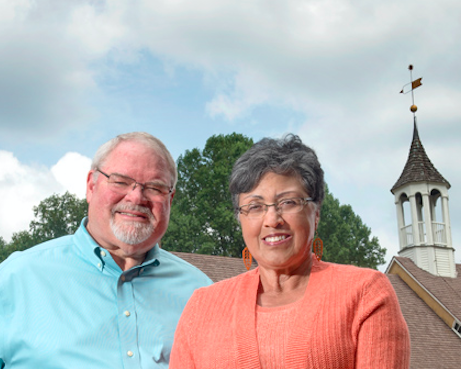Three statewide Baptist organizations are taking a different approach by teaming up to combat some of the region’s health challenges
Photo: Leland Kerr and Anita Holmes
By Les Gura
By nearly every economic measure — household income, employment, average wage — northeast North Carolina lags behind the rest of the state. Combine that with a rural landscape that makes it more difficult for people to make medical appointments, and you have a recipe for chronic health concerns such as cardiovascular disease, diabetes and obesity.
But northeast North Carolina has one powerful component in its favor — faith.
Teaming up for health
Now, three statewide Baptist organizations are taking a different approach by teaming up to combat some of the region’s health challenges. They are working with local churches, government agencies, providers and others to fulfill health needs still being identified. The collaborative was initiated in early 2016 by Wake Forest Baptist Medical Center’s Division of FaithHealth.
“If you think about health care as like being in a boat, the more folks you can get to guide that boat with good direction and resources the better,” says Kim Schwartz, chief executive officer of Roanoke Chowan Community Health Center, which provides primary care to adults who are uninsured or underinsured.
“Also, if the boat gets a hole in it and the rapids become too fast, there’s more than one way to deal with it.”
So far, the collaborative includes the General Baptist State Convention of North Carolina, which is the largest African-American convention in the state; the Baptist State Convention, which is the largest Baptist convention overall; and the Cooperative Baptist Fellowship of North Carolina.
Owned and driven by the communities
Two key people behind the collaborative are Leland Kerr, Baptist Health liaison for Wake Forest Baptist, and Anita Holmes, a FaithHealth contractor representing the General Baptist State Convention.
“I think historically, different groups do their own thing,” Kerr said. “It seemed like the right thing for FaithHealth to reach out to all of these organizations together because they all had churches in the area where congregants have great need.”
They envision a program like other FaithHealth efforts in North Carolina, in which churches recruit volunteers who are trained to provide different types of assistance to people with a health-related need. People in need may be members of an individual church or simply referred for help by a provider or social service agency.
Assistance might include rides to medical appointments, trips to a grocery store or pharmacy, companionship or the information they need to get help during a crisis.
“We want this to be owned and driven by the communities, so we’re starting where they are,” Holmes said. “We are working with churches and determining how resources can be matched with needs that the communities see with regard to health.”
Roanoke Chowan Community Health Center
For example, although the federally subsidized Roanoke Chowan Community Health Center provides primary care, its patients often have needs before or after appointments. If such needs are met (being able to ensure patients take medicines or can get to a pharmacy to pick up medicines, for example), they will be more likely to maintain good health.
Within the umbrella of the Community Health Center is another organization, Hertford Health Access, which recruits physicians to see patients free of charge if they require specialty care.
Weyling White, program coordinator for Hertford Health Access, says the fledgling FaithHealth effort in northeast North Carolina could provide important support.
 Besides medical needs, White says his program is trying to address social determinants of health among patients through surveys that might ask whether they were ever incarcerated, have they had trouble paying their mortgage, are they furthering their education.
Besides medical needs, White says his program is trying to address social determinants of health among patients through surveys that might ask whether they were ever incarcerated, have they had trouble paying their mortgage, are they furthering their education.
“Even though these questions appear to be less health care driven, they help us engage the patient to see what issues in their lives are impacting their health and their health outcomes,” White says. “We can use this to understand how to work with patients and move them toward living healthier and accessing the right foods, determining the resources they need for their day-to-day lives.”
“We’re looking at more than health equity,” White says. “We want uninsured patients to have equal footing.”
Help is welcomed
To the extent that volunteers through the region’s churches can help, assistance will be welcome. For example, Hertford Health Access is beginning education programs for patients in two areas: smoking cessation and balance (for elderly patients who experience falls). Some people may require rides to those programs, so volunteers would be welcome, White says.
Lou Ann Gilliam, director of church and community relations for Chowan University in Murfreesboro, says there is no question that a lack of mass transit is a problem when it comes to health care in northeast North Carolina.
“If we have buses or taxis, it’s very limited and not very affordable because we’re so spread out,” she says. “One of the challenges of being in a rural community is trying to get people to health care.”
Gilliam has connected different organizations with some of the region’s leaders as they explore options such as FaithHealth to improve health outreach in the region. She also has participated in two transportation summits in the past year. She says the partnership of providers, community health centers, health authorities, churches and others is critical to improving health.
“I think our faith communities are one of our greatest resources because they are folks that care,” Gilliam says. “If you don’t have good family support, you need another person to help intervene, and I see FaithHealth working through the ministers because they have the platform and know what the needs are.”

